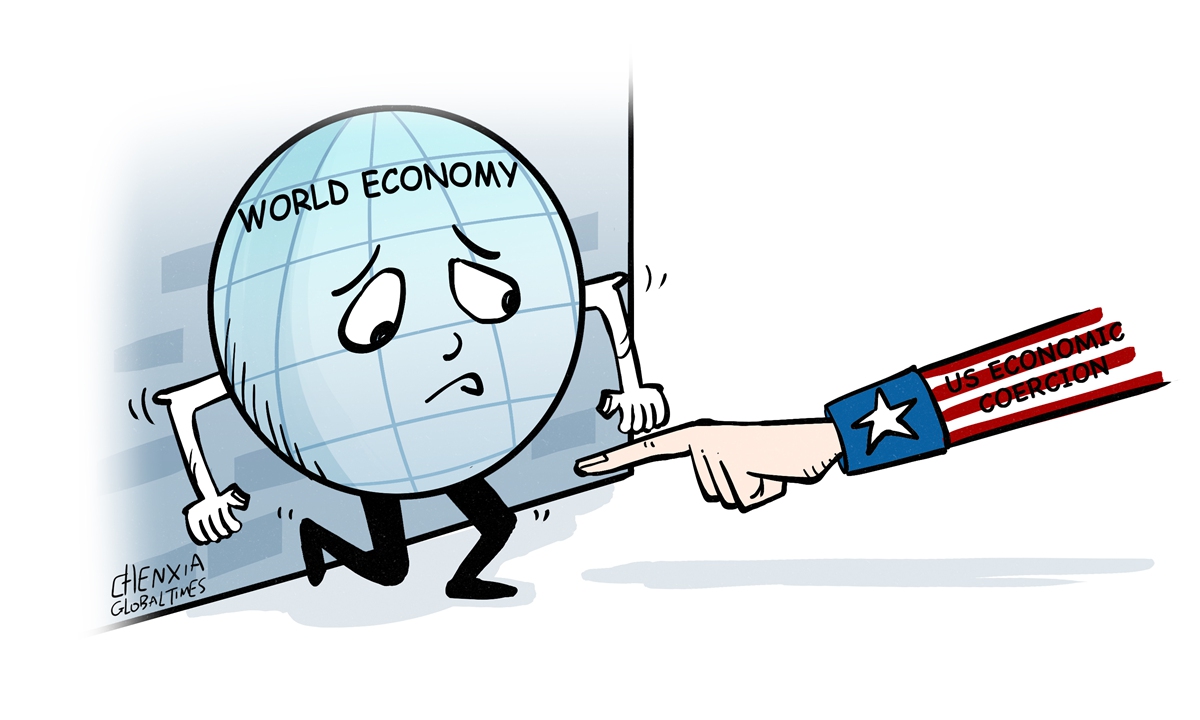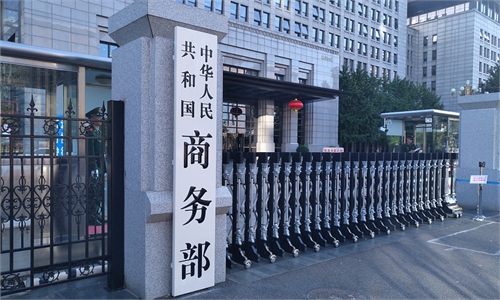
Illusration: Chen Xia/Global Times
Prior to and during the G7 leaders' gathering at Hiroshima, Japan over the weekend, there were media reports that US President Joe Biden cajoled the six American allies to take a uniform action to do something to stifle China's economic growth, which in essence is part of his "decoupling from China" push.
To persuade the leaders of Germany, France, Britain, Italy, Japan and Canada to follow the US' paradigm to form a unified western group to throttle China's rise, the Biden administration is throwing mud at China, accusing the world's second-largest economy of restoring to "economic coercion" in its interaction with other economies.
But the US government's allegations against China are full of malice and hypocrisy. In the past decades, the world has eye-witnessed too many American smoking guns when it comes to coercing its adversaries and allies alike in order to maintain US' sole superpower position.
Acknowledging the US itself cannot do much economic harm to China, Washington has gone bare-knuckled to enlist more of its traditional allies to form a "gang" to subdue China's growth. Bob Menendez, the chairman of the US Senate Foreign Relations Committee, even called for the formation of an "economic NATO" to encircle and harass China, media reports said.
As a matter of fact, "China never makes provocations at others' doorstep or reaches its hand into others' homes," and "China never wages tariff wars or groundlessly hobbles any foreign companies," China's Foreign Ministry said recently. To claim China for engaging in the so-called "economic coercion" is no more than lodging trumped-up charges, and the accusation is totally untenable.
In the past many years, it is the US government that is using nefarious means, including political isolation, unilateral economic sanctions, military threats and technology blockade - all textbook coercive measures to suppress the weak and small, and at the same time force its own allies to follow its steps. Some countries, for example Japan, cowered to its menace.
In the 1980s, Japan's economy was galloping and its GDP reached more than half of the US' size. To slow down Japan's growth, Washington imposed coercive measures to punish its biggest ally in Asia, mercilessly. The US forced Japan to sign the "Plaza Accord" in New York in 1985, forcing the yen to appreciate against the dollar, which triggered rapid expansion of Japan's domestic economic bubble, the collapse of its real estate sector and the subsequent "Lost Three Decades" - the long-term stagnation of Japanese economy up to now. The "Plaza Accord" is a masterpiece of US economic coercion.
And, US' customary trade bullying is another typical means of enforcing economic coercion. Washington has developed a host of trade suppression measures, such as levying tariffs, restrictions on imports and exports, and imposition of hefty fines. To punish other economies and companies, it has churned out a broad variety of trade control lists - lists of entities, unverified lists, lists of military end users, lists of industry sanctions and more. And, through the signing of the so-called US presidential executive orders, Washington has forcibly halted or terminated some foreign enterprises' operations in the US, or moved to prohibit American companies from trading with some foreign corporations.
In the past 10 years, the US has frequently restricted overseas investment in telecommunications, AI and other high-tech on the grounds of protecting its "national security". Many foreign companies were placed on the US' entity list of strict export control. Huawei of China, Alstom of France, Siemens of Germany and a long list of other multinationals have all got a bitter taste of Washington's economic coercion.
Lately, the US government targeted its coercive measures on the semiconductor industry, by extracting confidential information from global semiconductor makers, and prodding them to set up new production lines in the US.
Washington's "long-arm jurisdiction" is another commonly used means of coercion. The US has enacted a series of domestic laws to impose sanctions on selected countries, companies and individuals. The country arbitrarily expands the jurisdiction of its domestic law to engage in long-arm jurisdiction with foreign entities.
The US currency, the dollar, also acts as a crucial basis for US economic coercion. Freezing dollar-denominated assets, and cutting off from the dollar-based SWIFT transaction system are all the usual tricks of Washington to impose financial sanctions on other economies, by taking advantage of the dollar's global reserve and payment currency position.
Since 2016, the US government has recklessly waged trade wars, imposed technology blockade and promoted economic "decoupling", which have seriously undermined economic globalization and regional economic integration, leading to increasing disruption of global supply chain and fragmentation of the global economy.
The US government has actually become the biggest disruptor of the rules governing globalization, which may come with unprecedented economic loss for many countries and regions including the US.
But China, as the world's largest trader, is not to be swayed by this headwind, will continue to open up its huge market to welcome foreign investment.
The author is an editor with the Global Times. bizopinion@globaltimes.com.cn



